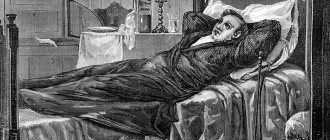Reviews of Oblomov's book
#death (North America - the cover depicts an elderly man, servant Zakhar)
To each his own!
I would like to analyze this novel, but not from the point of view of the classic question “What did the author want to say?” I will leave that to literary scholars, but what exactly did I see in this book.
The main character appears before us - Ilya Ilyich Oblomov. The author paints him as apathetic, infantile, devoid of motivation and aspirations. And then he contrasts him with Stolz, Oblomov’s friend - active, inquisitive, with fortitude. It would seem that everything is clear - the book is intended to show that laziness makes any person degenerate. But, in my opinion, everything is somewhat different.
Before us are two pronounced psychological types - the introvert Oblomov and the extrovert Stolz. Oblomov, due to his upbringing, psychological attitudes, his type according to Jung, simply could not love the crowd and active communication. Even when he tried to go out into the world, he only succeeded in normal communication with Olga Sergeevna Ilyinskaya; with other people, communication was established with great difficulty or completely failed.
Add here the fact that early guidelines for building a communication model had already turned Oblomov away from the noise of the crowd. The author describes his father as a man who was content with a small income from the estate, never dealt with the manager, even if he saw that he was stealing, he enjoyed sleep, food and did not waste his nervous system on solving important issues. Is it any wonder that Oblomov Jr., seeing such a way of life, came to the conclusion that this is how one should arrange his destiny.
Ilya Ilyich, in addition to being an introvert, has a pronounced infantilism. Roughly speaking, despite his age, already over thirty years old, he continues to behave like a child. After all, children only love to sleep and eat, and the kids also have nannies and tutors - namely, Stolz and Zakhar, the Oblomovs’ old servant, act as such patrons. Ilya Ilyich, he is like a little child, can be naive in relation to his friends or just everyday affairs, he is capricious, namely, that like a child - to remember, at least, the problem of his moving from his old apartment.
While his parents were alive, they took care of Ilya, despite their love for dozing, Oblomov Sr., nevertheless, was forced to make decisions that concerned his son, and involuntarily played the role of a protective parent. After his death everything disappeared. Ilya Ilyich was not prepared for the fact that people outside his family were completely different - rude, deceitful and hypocritical. At the first major problem, he behaved not like an adult who would learn from his mistakes, but like a child - he ran away and hid. The first time it saved him from a reprimand at work, so he began to adhere to this strategy, even if he sacrificed his career, but he won’t be scolded! That is, the thinking of an immature person again.
But gradually, this sitting “in the house” simply turned into a protracted depression. Oblomov understood perfectly well that he was not suited for everyday life, that he was not created for a career as an official, he had no acumen, and would never become as interesting as Stolz. It seems to me that this imperfection in his behavior depressed him, so he ran away into an illusory world, where he was loved by everyone, needed by everyone, that is, he simply slept.
Therefore, I consider his letter to Olga Sergeevna the only honest and wise decision; he says correctly - they are not suitable for each other. Oblomov understands what he is and strives for his own, Oblomov’s, happiness, even if it offends those around him.
And here, in my opinion, it’s worth looking at the plot from the angle that everyone’s concept of happiness and a successful life is different. Oblomov would not have been able to exist in the world in which his friend Stolz lived. To be active and needed by everything would not have brought him happiness, in fact, because his dreams and reality were very different, since, I repeat, Ilya Ilyich is an introvert, focused on his inner world. Therefore, he chooses what is right for him, lives his own life, and not someone else’s life that Stolz imposes on him.
Was this life good? It depends. For Oblomov, of course, everything was normal, he received a family, satiety and peace, and the rest was a side effect of “happiness.” For Stolz and the others, such lying on the sofa, in a dressing gown, is an obvious death of the spirit and the person, because they have completely different attitudes.
But to each his own! Everyone chooses their own type of life, in Oblomov’s style or in Stolz’s style. Of course, this book is worth reading - the light style and irony will allow you to quickly swallow the thick volume, and the book itself can push the reader to reason about who Oblomov is - a quitter or just a misunderstood introvert!
Reviews of the book “Oblomov” by Ivan Goncharov
Oh, what a heap of thoughts in my head after this book! Abandon hope for a coherent review, everyone who enters here, because from the spinning whirlwind of thoughts I will randomly extract any one, so as not to forget to talk about everyone. I ask you to follow further only those who, firstly, have read the novel; secondly, who, like me, loves him very much; and thirdly, who has a lot of free time to read the review.
For 30 years and 3 years Ilya Ilyich Oblomov of Muromets lay on the sofa of the stove until he was awakened for exploits. Funny coincidence, isn't it? But Oblomov not only did not accomplish any feats, but also completely disappeared. Question: was it even worth moving him from his place, lifting him from the sofa? It’s a paradoxical thought, but perhaps Stolz and Olga only made things worse by deciding to pull Oblomov out of the swamp. Remember when in Oblomovka they decide to fix the porch, which has been broken for 20 years. As soon as it was repaired, it completely collapsed. Sometimes the only way to keep something is not to touch it, not to touch it. This deep thought is well suited for Russia: as soon as we start to radically change or reform something in the country, it only gets worse - take 17 or 1991, for example. The question arises: why did you lie there? If you say “laziness”, by the way, I won’t say hello to you anymore - this is such a banal simplified explanation that you want to wince. On the first page it says:
Lying down for Ilya Ilyich was neither a necessity, like that of a sick person or like a person who wants to sleep, nor an accident, like that of someone who is tired, nor a pleasure, like that of a lazy person: it was his normal state.
Therefore, I propose to replace the word “laziness” with the word “inaction.” He does nothing because he looks for meaning in everything. Why fuss and travel around for lunch if it’s pointless? No, no, I by no means justify Oblomov, but I also don’t see convincing arguments in Stolz’s position in life. Work for the sake of work, activity for the sake of activity? Yes, I agree, life is a movement, but let it be purposeful, not Brownian. But Stolz just lives, moves somewhere, without thinking. In one of my few amateurish stories there is a conversation that will be a good illustration of what was just said:
- Where are you going? - I'll go look at the stars. You know I like it. - You need to sleep. - For what? For what?! To get enough sleep, to go to work refreshed, to earn more money, to buy food with it, to come home and eat it, to go to bed full and satisfied, to get enough sleep and go to work?
In this regard, I am, of course, more sympathetic to Oblomov than Stolz. These two images are so polar, so opposite, that it is impossible to love or hate both at the same time. Mind and heart. Soul - and body. "Lyricists" - and "physicists". Goncharov amazingly managed to maintain neutrality; he does not highlight either one or the other for the better. But the reader always loves either one or the other. _ _ _ _ _ _ _ _ _ _ _ _ _ _ _ _
Who do you love more and why? (write your answers in the comments)
- Oblomov - Stolz _ _ _ _ _ _ _ _ _ _ _ _ _ _ _ _ Personally, I am, of course, Oblomov. In many ways. For many years now I have been planning to return to creativity and write prose, but everything is somehow... And Goncharov was also Oblomov - lazy, slow, sybaritic; I wrote novels for 10-15 years. And I started writing this novel to try to figure out my problem, my Oblomovism. But let's look around: half of our Russians are Oblomovs, not in all, of course, but in part. Everyone likes to put off until later what can be done today; everyone wants “...and not to go to the village, and not to move out of the apartment, and for things to get done...”
So maybe Oblomov is a true Russian character, best reflecting the essence and mentality of our people. The school interpretation - a weak-willed lazy person, a disgrace to the nation - which coincides with Dobrolyubov’s opinion in that very article “What is Oblomovism?” cannot be taken for granted. Why do all these guests in the first part go to him? And let's remember the last part: when Stolz informs Ilya Ilyich that he is married to Olga, literally, I, the reader, immediately became envious, as if bile was spilling in my chest; What about Oblomov? He is glad and happy because Olga and his friend are happy! My blog, what a great guy! And how he unwittingly betrayed Pshenitsyn! Together with Ilya Ilyich, she found the meaning of existence, and her soul began to awaken in her. Finally, Stolz and Olga would not have had that happiness if Oblomov had not been in the lives of both, like a butterfly effect. And then, that’s how he was raised! We can hardly understand what influence the way of life, everyday life, habits and manners established in childhood have on our future lives. This worldview, which was instilled in Ilyusha in Oblomovka, is extremely difficult to radically change. Here the social subtext of the novel already creeps in, allowing one to criticize the nobles of that time for their hedonistic lifestyle.
True, one can argue about the above-mentioned happiness of the Stolts. I have no doubt that Olga, even after marrying Andrei Ivanovich, still loves Oblomov. Maybe she loves only him alone, maybe both of them at once. Be that as it may, the fact is that he loves. Otherwise, why would she be Ilyinskaya, i.e. belonging to Ilya (being Alexey Alekseevich, I even thought that I needed to find a girl named Alekseeva). And this despite the fact that she doesn’t seem to be a match for him, and Pshenitsyna is more suitable for Oblomov. But so what? My personal opinion, which also creeps into Goncharov’s, is that you can love two people at once, with two equal loves, if the lover has an all-encompassing heart, where there is a lot of room for love. The love of Oblomov and Olga is a real textbook of relationships that young people can learn from. Experiences, meetings, tears, fear, inspiration, letters, mistakes - everything is here. Out of curiosity, I typed Casta Diva into Wikipedia. Here is a literal translation of one passage:
Oh! My beloved will return to me, faithful to his first love. And against the whole world I will become your protection.
Oh! My beloved will return to me, Your rays will illuminate me, and on Your chest I will find life, homeland, and heaven. Ah, become again what you once were, When I gave my heart to you, Come back to me.
In my opinion, this is the most obvious hint at the relationship between Olga and Oblomov. But the beloved did not return and did not become what he once was. And I don’t believe that they would be happy together. Olga’s love for Oblomov is a project to save animals listed in the Red Book. She didn't love him so much as she loved herself next to him. If Stolz hadn’t pointed him out, she would hardly have even paid attention to Oblomov. This is a deep tragedy: both love, but cannot be together.
But Oblomov and Zakhar are destined to always be together. Zakhar is an even greater “Oblomov” than his master: a real lazy person, a gossip, a coward, but not without a soul, loving his master to the grave. A constant companion, whom I would compare to Sancho Panza. And Oblomov is nowhere without Zakhar, and vice versa. After the death of the master, Zakhar loses the meaning of existence, immediately gives up and becomes an alcoholic. He even refuses Stolz’s offer to go with him, because he cannot leave Ilya Ilyich’s grave.
At the end, for some reason, Goncharov describes for many pages how Olga, already a wife and mother, suddenly begins to feel sad, something is gnawing at her. You can attribute this to the fact that she doesn’t really love Stolz and feels unhappy. But no. Olga is happy, her dream of true love has come true. In parallel with this, Oblomov’s dream of finding final peace came true. And this, it seems to me, is why Goncharov gives this passage - to show what to do when a dream becomes a reality
. Olga, so happy that she had already begun to feel unhappy from this, was able to overcome herself and find new meanings. This is the best choice. Oblomov, in turn, living on the Vyborg side, as if in paradise, no longer found motivation for himself, and therefore died soon. This is the worst choice.
Such multi-page passages about the thoughts and experiences of the characters make the novel, well, boring. Moreover, there is no plot twist in it. The events can be described in one phrase: a fat lazy gentleman falls in love with a woman, her best friend takes her away, after which the gentleman dies.
However, lovers of psychological dramas, like me, will be pleased - there were surprisingly many chapters here that evoked genuine sadness (the meeting of Stolz and Zakhar), joy (in the best moments of the relationship between Oblomov and Ilyinskaya with lilac branches, etc.), tenderness (the decision Olga and Stolz about marriage), disappointment (Oblomov’s letter to Olga), etc.
Wow, it didn’t turn out that bad, but, as I expected, my thoughts were running wild (don’t complain to me, I tried). It's all because I was very impressed by the novel. A novel that is briskly included in the selected list of the most beloved.




